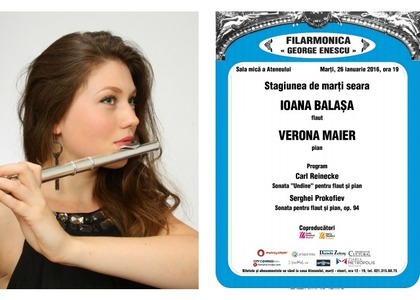> [Archived] Chronicles

The Theatrical Season of Tuesday evening - 26th of January, 2016
Ioana Balasa: Taineke is a composer less known, a romantic one, and Prokofiev is a modernist, neoclassic and cosmopolitan in expression. He imposes enough difficulties in technique and performance, but one must be truly enthusiastic that a composer like Prokofiev has been inclined towards flute. He wrote a sonata.
Ioana Balasa evolved together with the pianist Verona Maier. The one who guides her steps at the master of chamber music that the young flutist fallows has paid attention to her evolution, stating:
Verona Maier: There are two reference's opuses in the literature for flute and piano. These are two standard works. There is no flutist who can skip these two works. These two are landmarks of the creation in which the flute "suffers" such a ruthless treatment. It is about contraposition of an instrument that produces, as you could see what it can produce. I mean the piano and the writing of the two sonatas suppose a huge quantity of technical difficulties, especially an opposition out of the common patterns. This was also an important performance for her.
Translated by Negoiță Roxana-Beatrice
MTTLC, the University of Bucharest














